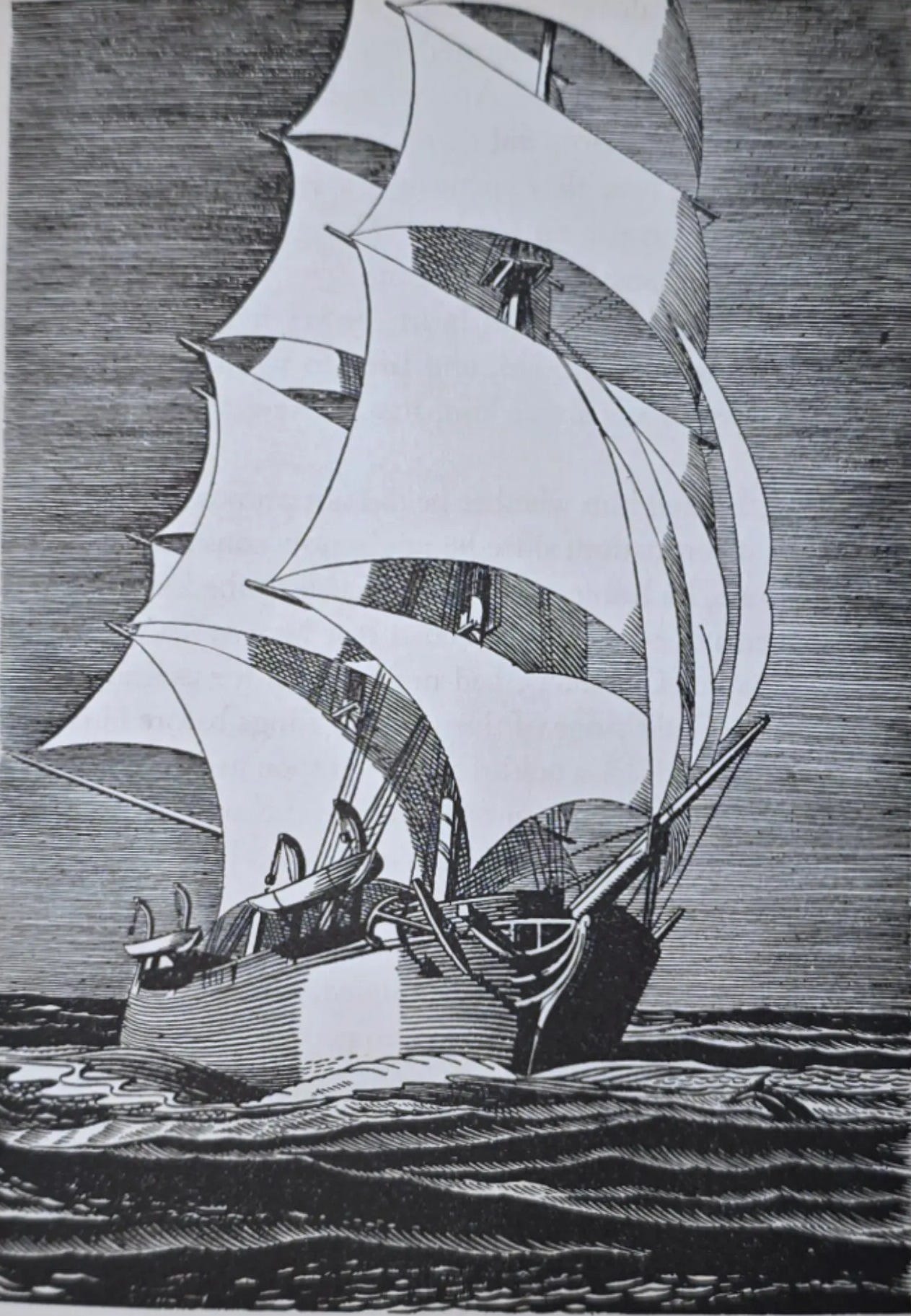Rockwell Kent, The Pequod, from the 1930 Lakeside edition of Moby Dick.
I have been giving some thought over the last two weeks to the Penitential Vigil conducted on the eve of this October’s Synod meetings. I was struck, above all, by the apologies spoken on behalf of the Church by seven of the cardinals closest to Pope Francis.
These apologies garnered but little attention in the media, secular or Catholic – whether due to the absence of tie-ins to specific scandals du jour or simply because the onetime spectacle of the Catholic Church apologizing has become so commonplace – something less than once in a blue moon become something more like any time out of a clear blue sky. Yet these apologies struck me as particularly revealing, both for the Church toward which the Synod is laboring and for the practices from which it seeks to disengage.
As I listened to the texts (and subtexts) of the apologies, a phrase kept occurring to me: That is hard which should be soft and that is soft which should be hard. This Shakespearean-sounding sonority rang in my head, as I reflected on the points where hardness of heart and a soft touch with the forces of unjust power have put the one true Church so tragically in the wrong. Where had I read this?
Listening as, one after another, the cardinals took account of myriad ways of abandoning and exploiting the vulnerable and aligning ourselves with wealth, power, privilege, and self-glorification, of coupling uncompromising moral demands with self-serving moral compromises, of unconcernedly sailing the Barque of Peter past the drowning, one point seemed ever clearer. Much as the papacy of Benedict XVI was rooted in a stand against relativism, so the Francis papacy is an ongoing witness against utilitarianism… with one conspicuous difference being that, where relativism enters the Church from without, utilitarianism is as firmly ensconced within as it is anywhere else in the world.
How so? The Church has never taught that the end justifies the means. Yet even a little self-certainty or arrogance can open the floodgates, when matters as all-encompassing as eternal salvation and the human relationship to an all-powerful deity are at stake. Is it so against charity, to wish others to be saved? – even despite themselves, or against their will? Should potential converts be scandalized and turn away from the narrow path because of one corrupt cleric – or a dozen, or a hundred? And having brought this news of salvation to others, what more can I owe them? What can they expect of me? Do they not, rather, owe me some temporal recompense for the eternal goods I have placed within their reach?
I remember, years back, a friend saying: “The Church is an engine for the salvation of souls.” To hear this from my friend – who had shown uncommon generosity, humility, and loyalty through many years – made my heart sink. Such a church is exactly what he said it was: a machine… a machine for dealing with God, or rather with a god, a god that is likewise a machine. A god whom we do not love (for who can love a machine?) but do fear, and fear not as one would fear an enemy or a wild beast, but as one would some vast, impersonal force, like being struck by lightning – a favorite popular trope, actually, for jokes stereotyping divine action in the world.
And that quote: That is hard which should be soft and that is soft which should be hard… Where had I read it?
A utilitarian faith asks of us at once too little and too much. On the one hand, such a faith cannot take the universal call to perfection seriously; far likelier, it will foster a disposition of narrowly parsing venial vs. mortal sins, resentfully relinquishing scraps of (generally overvalued) earthly goods, with a hearty helping of sacramental patchworking in lieu of moral or spiritual growth, all in pursuit of an actuarial approach to an afterlife taken in the most self-centered possible way. Any higher ambition toward God in this template will likely consist in purer, more elaborate, more extensive ritualisms.
On the other, a prime focus for such believers is to agitate for the salvation of others. In itself, this even seems reasonable, given its presuppositions; the whole of such a life is focused on issues of judgment and condemnation, perhaps even more than salvation. Yet an understanding of salvation which is so limited and earthly-minded just can’t get it right. More and more effort is spent observing, admonishing, shaming, manipulating, and condemning others, while less is left for friendship and accompaniment – or for communion with God.
How much better to take Jesus’s words in Matthew as a warning: “Woe to you, scribes and Pharisees, you hypocrites. You traverse sea and land to make one convert, and when that happens you make him a child of Gehenna twice as much as yourselves.” I must admit that I never really understood what our Lord was saying in that passage. Yet the more we concede to the utilitarian mindset, the more corners we will cut humanistically, ethically, and morally, in pursuit of another win. A win, as we tell ourselves, for God – for God who is on our side.
But God is not on our side. We, with grace and vigilance, may hope to be on God’s side. Nor is God a machine, nor are the commandments and the precepts of the Church a manual of guidelines for “God management.” God is a Father – the Father – and the divine law is his guidance, given for our good out of love, and the Church is the Body of Christ, a living sacrifice of praise. To live all of this, or at least to live enough of it to carry us through our own time, we need to learn to be hard with ourselves, soft with the wounded and the weak, to do more to be holy as he is holy.
In his apology, Cardinal Victor Manuel Fernandez, Prefect of the Dicastery for the Doctrine of the Faith, said:
“I ask forgiveness, feeling shame for all the times that in the Church, especially us pastors who are entrusted with the Church, with the task of confirming our brothers and sisters in the faith, have not been able to guard and propose the gospel as a living source of eternal newness, indoctrinating it and risking reducing it to a pile of dead stones to be thrown at others.
I beg forgiveness, feeling shame, for all the times we have given doctrinal justification to inhuman treatment. I ask forgiveness, feeling shame, for when we have not been credible witnesses of the fact that the truth is free, for when we have obstructed the various legitimate inculturations of the truth of Jesus Christ, who always travels the paths of history and life, to be found by those who want to follow him with fidelity and joy.”
and Cardinal Christoph Schönborn, Archbishop of Vienna and co-author with Joseph Cardinal Ratzinger of the Catechism of the Catholic Church, said:
“I ask forgiveness, feeling shame for all the times that we have not heard the Holy Spirit, preferring to listen to ourselves, defending opinions and ideologies that hurt the communion in Christ of all, expected at the end of time from the Father. I ask forgiveness, feeling shame, for when we have transformed authority into power, suffocating plurality, not listening to the people, making it difficult for many brothers and sisters to participate in the mission of the Church, forgetting that we are called in history, forgetting that we are all called in history to faith in Christ, to become living stones of the one temple of the Holy Spirit.”
It did ultimately occur to me whence the phrase in my memory came: That is hard which should be soft and that is soft which should be hard. It is spoken by the ship’s carpenter at the very beginning of the final, powerful, blank-verse section of Herman Melville’s Moby Dick. This carpenter, as Ishmael the narrator tells it:
was singularly efficient in those thousand nameless mechanical emergencies continually recurring in a large ship, upon a three or four years' voyage, in uncivilized and far-distant seas. For not to speak of his readiness in ordinary duties… he was moreover unhesitatingly expert in all manner of conflicting aptitudes, both useful and capricious….[T]his carpenter was prepared at all points, and alike indifferent and without respect in all. Teeth he accounted bits of ivory; heads he deemed but top-blocks; men themselves he lightly held for capstans. But while now upon so wide a field thus variously accomplished and with such liveliness of expertness in him, too; all this would seem to argue some uncommon vivacity of intelligence. But not precisely so. For nothing was this man more remarkable, than for a certain impersonal stolidity as it were; impersonal, I say; for it so shaded off into the surrounding infinite of things, that it seemed one with the general stolidity discernible in the whole visible world; which while pauselessly active in uncounted modes, still eternally holds its peace, and ignores you, though you dig foundations for cathedrals.
To my reading, this carpenter is much like the Deists’ watchmaker god, the “pure manipulator” (Melville again) making all things with an utterly detached indifference. To such a god, one might perhaps offer a purely ritualistic worship. But the Church, for all the sin she has harbored, is wiser than the ways of men; she knows her God better than that, as the cardinals’ mea culpas clearly indicate.
For, after all, the God we worship is a different kind of Carpenter altogether.






Excellent analysis - with which I heartily agree, Paul.